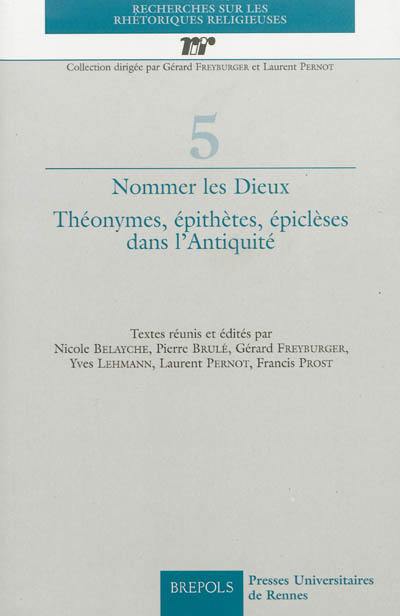
Fiche technique
Format : Broché
Nb de pages : 665 pages
Poids : 400 g
Dimensions : 16cm X 24cm
ISBN : 978-2-503-51686-8
EAN : 9782503516868
Nommer les dieux
théonymes, épithètes, épiclèses dans l'Antiquité
Quatrième de couverture
La collection
La collection Recherches sur les Rhétoriques Religieuses (RRR) a pour objet le langage dans ses rapports avec le divin, les formes de communication avec les dieux, les différentes manières de dire la conscience et le sentiment religieux. Elle entend fournir des instruments et ouvrir des voies nouvelles pour une meilleure compréhension de la rhétorique et de la religion.
Le présent ouvrage
Les avancées de la critique moderne sur le mythe et sur l'histoire des religions antiques en général ont radicalement modifié notre manière d'examiner le nom et la nomination des dieux. Deux axes surtout se dégagent aujourd'hui : la question du rapport entre le récit mythique et le nom (tout nom «parlant» raconte) et la nécessité pour les fidèles d'identifier le divin, de le discriminer, de le nommer, ceci surtout dans le polythéisme, mais aussi dans les monothéismes.
Le fait que cette identification soit commune (et communautaire) attire l'attention sur une autre exigence méthodologique, qui veut qu'au-delà du signifié «entité divine», on n'oublie pas l'acte de langage et son contexte inclus dans l'usage du nom, ce qui revient à s'intéresser à sa dimension linguistique et sociale.
A travers les religions grecque et romaine, mais aussi, dans un esprit comparatiste, la religion égyptienne, pharaonique et ptolémaïque, le monde oscophone, le judaïsme et le christianisme, à travers les textes, littéraires et autres, en prose et en vers, les papyri, les inscriptions, les graffiti vasculaires, le présent ouvrage trace de nouvelles directions, à la croisée du fait rhétorique et du fait religieux.
Issu de deux colloques organisés par les universités de Rennes, de Strasbourg et de Naples, Nommer les Dieux est un livre construit et repensé, fruit d'un long processus ; il est appelé à faire référence.
The series
The series Research on the Rhetorics of Religion (RRR) studies language in its relationship to the holy, the means of communicating with the gods, the different ways of expressing one's awareness of the divine and the feelings which it elicits. Its goal is to provide instruments of analysis and to open avenues of research which will allow a better grasp of rhetoric and religion.
The present book
Advances in the modern interpretation of myth and in the history of ancient religion in general have radically modified our ways of studying the names and the naming of the gods. Two avenues of research notably are current today : the relationship between the narration of the myth and the name (all «speaking» names tell a story) and the necessity for the faithful to identify, to distinguish and to name the divine, in polytheisms naturally, but also in monotheisms.
The fact that this identification is made in common (and in community) draws attention to another methodological requirement. Beyond the signified «divine entity» lie the language act and its context, which are part of the naming : this means that its linguistic and social aspects must be taken into consideration.
By its treatment of the Greek and Roman religions, but also, in the interest of a comparatist point of view, the Egyptian religion (under the pharaohs and the Ptolemies), Oscan-speakers, Judaism and Christianism, by its treatment of texts, literary and other, in prose and in poetry, papyri, inscriptions, vascular graffiti, the present book opens new perspectives through the meeting of rhetoric and religion.
The result of two colloquia organised by the Universities of Rennes, of Strasbourg, and of Naples, Naming the Gods is a book which has been carefully constructed and thought out through time ; it promises to be a landmark.





